
ChangeThis
ChangeThis is our weekly series of essays from today's thought leaders that are meant to evoke conversation by bringing forth new and unique ideas.
ChangeThis
-
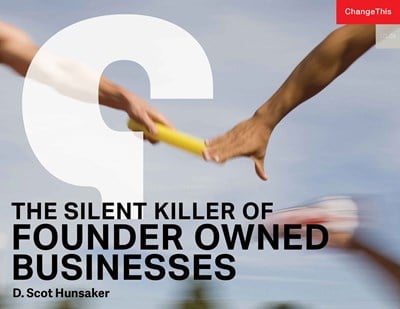
Blog / ChangeThis
The Silent Killer of Founder Owned Businesses
By D. Scot Hunsaker
"In the entrepreneurial world we have a silent killer. We don't talk about it very much, but it can put an end to a lifetime of hard work and planning. We owners take all of the risks and sometimes withering criticism and we start a business because we believe in what we and the business could accomplish in the world. Then, over time we build a thriving organization. It hums along, makes money, benefits everyone involved, meets customer demand, and helps the community grow and prosper. All good so far. But then we decide to make our exit, or the decision is made for us by health or family issues or other business interests. So, now what happens. Well, at least two thirds of the time, the business ceases operations, with all of the collateral damage that does. It happens because we never transition the company to the next generation of leaders, not because we don't know how, but because we never get around to it. As CEO's and entrepreneurs, perhaps we think it will never happen to us, that maybe we have discovered the fountain of youth.
Categories: changethis
-
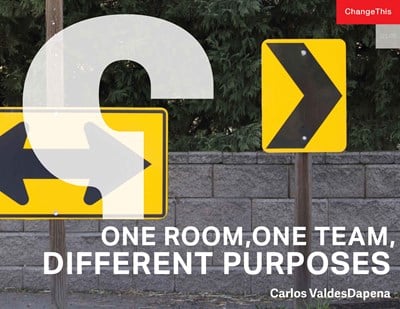
Blog / ChangeThis
One Room, One Team, Different Purposes
By Porchlight
"We preach collaboration, talk and train teamwork, but all the while organizations are optimized to manage, foster and reward individual effort. I'm not the first person to notice or write about this. Nonetheless, most approaches to team effectiveness aren't designed to directly confront this organizational paradox: Collaboration is second- or third-nature for a large majority of us and this predisposes us to consistently revert to our more selfish ways, especially where we're rewarded and recognized to do so."
Categories: changethis
-
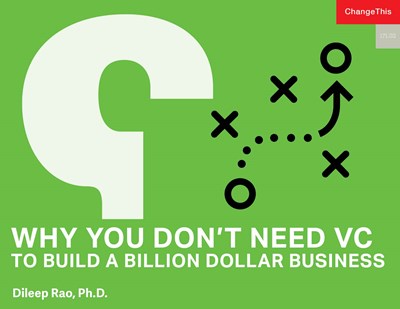
Blog / ChangeThis
Why You Don't Need VC to Build a Billion Dollar Business
By Porchlight
"Although the business press is filled with exploits of VC-funded ventures, the reality is that 94 percent of billion-dollar entrepreneurs took off without VC, and only about one in 10,000 entrepreneurs truly benefits from VC. Silicon Valley venture capital is like a very successful lottery. Yes, there is flash and dazzle and a few billionaires are created. But it is hit-or-miss, mostly miss. You would not recommend a career of buying lottery tickets to your children or pick it for yourself. Learn skills. Use smart strategies. You may succeed whether you win the VC lottery or don't For entrepreneurs who want to reduce the role of luck in their success and improve their odds, here are six reasons why you don't need VC to build a billion-dollar business."
Categories: changethis
-
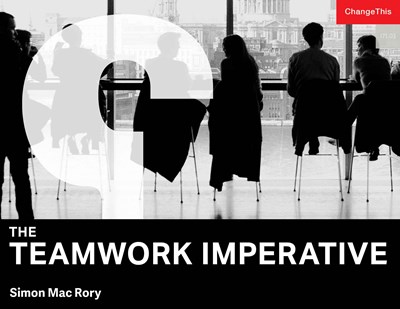
Blog / ChangeThis
The Teamwork Imperative
By Simon Mac Rory
"Teamwork is a (if not the) quintessential and critical element of organizational life. Over 90 percent of what we do in our work lives happens through collaborative effort. That makes teams and teamwork the most important means of output and productivity in the organization. I think most organizations and people would agree with this statement. So you would think that organizations would treat team performance as a strategic imperative, but most do not, preferring to muddle on with poorly performing teams and accepting mediocrity. There needs to be a big attitude change and it needs to be now. [. . . ] Only 10 percent of teams are high performing, a frightening 40 percent are dysfunctional and detrimental to members experiences and lives, leaving 50 percent which are performing—at best—with small incremental results. This is what most organizations accept. I consider this unacceptable, particularly when delivering high performing teams is not rocket science. But it does take effort, it does take strategy, it does take time, it does take budget and, critically, it takes persistence and commitment from the organization, leaders and team members.
Categories: changethis
-
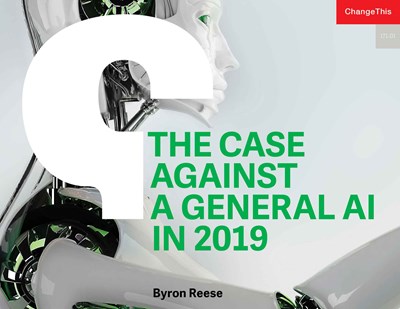
Blog / ChangeThis
The Case Against a General AI in 2019
By Byron Reese
"Artificial General Intelligence (AGI) is either possible or it isn't. The chasm that divides the two viewpoints couldn't be wider because it has to do with our core beliefs about the nature of reality, the identity of the self, and the essence of being human. There is no real way to bridge the gap on the question of AGI between those with different views on these questions. But we can at least understand why the views are so different."
Categories: changethis
-

Blog / ChangeThis
Playing Fair While Creating and Unfair Advantage
By Anthony Iannarino
"For most of us in sales, winning new business often means taking that business away from a competitor. The euphemism we use to describe stealing a client from a competitor is called 'a competitive displacement,' which sounds a lot nicer than 'eating their lunch. ' However, if this sounds harsh, know that while you are trying to take clients from your competitors, they are trying to steal your clients from you. Like other forms of competition, selling requires a sense of fairness, a set of ethics, ground rules, if you will. Certain behaviors are off limits, like lying about your competitor, talking bad about them, providing kickbacks, or misleading people into believing something that isn't true as it pertains to about how you can better serve them. These dirty tricks are off limits, and they aren't how you gain a real advantage. That said, there are ways you can create an unfair advantage and position yourself to win new clients that are presently being served by your competition. ".
Categories: changethis
-
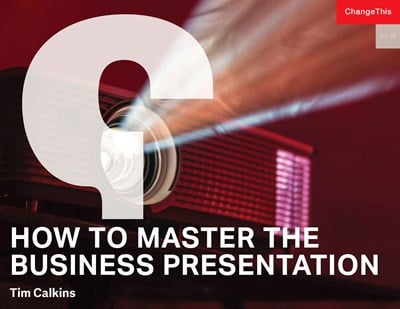
Blog / ChangeThis
How to Master the Business Presentation
By Tim Calkins
"The business world revolves around presentations. When it comes time to make a decision, people sit down to review the analysis, discuss the issues and reach agreement. Later, executives communicate the strategy to employees with presentations. When there are issues to wrestle with and bumps in the road, people create presentations. While emails and text messages are now ubiquitous, they rarely replace the presentation. It is hard to debate and discuss in depth in a text message. As a result, if you are going to be a successful business lead, you have to know how to create and deliver presentations that are tight, logical and convincing."
Categories: changethis
-
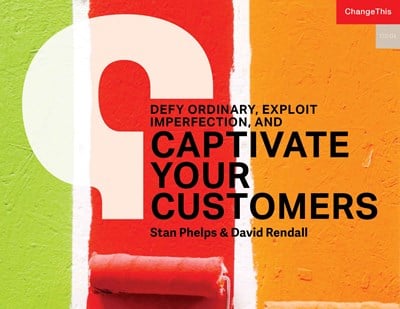
Blog / ChangeThis
Defy Ordinary, Exploit Imperfection, and Captivate your Customers
By Stan Phelps
"It's very common for brands to homogenize. As we look at what successful companies are doing, it's natural to emulate them. This has even been institutionalized in the process of benchmarking. We try to find out what others are doing right, and then do the same thing. It sounds reasonable, but there's a problem. The problem is that when everyone in an industry starts copying the leaders, then, over time, the entire industry starts to look the same, feel the same, and sound the same. There are no differences. Nothing distinguishes one brand from another."
Categories: changethis
-
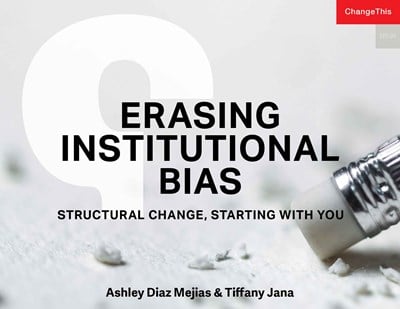
Blog / ChangeThis
Erasing Institutional Bias: Structural Change, Starting with You
By Tiffany Jana, Ashley Diaz Mejias
"Working against institutional bias involves more than just increasing simple numbers. It includes the hard and often vulnerable work of making room at the table, on the board, and in the c-suite for those who have not historically been represented. It requires undoing our cultural assumptions about what bias is and how it works, and then giving ourselves over to the introspective and collective work of erasing institutional bias. It's about doing this all in our everyday workspaces."
Categories: changethis
-
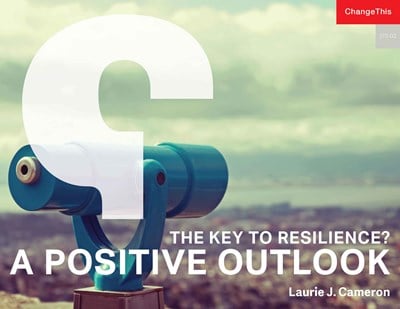
Blog / ChangeThis
The Key to Resilience? A Positive Outlook
By Laurie J. Cameron
"Researchers find that people who are resilient tend to be more positive and optimistic compared to those who are less-resilient. They are better able to regulate their emotions. And they are able to maintain their optimism through the most challenging situations. Resilience, a positive outlook, and optimism are connected. So, is having a positive outlook something you are born with, or can it be developed. Good news. A positive outlook can be cultivated with mindfulness. You can learn to choose your mindset and to shift how you relate to your experience, so that you have less stress and more joy. Mindfulness is a capacity that allows you to deliberately direct your attention towards the positive instead of being tossed around by random thoughts and turbulent emotions. What we see in stories of positive outlook and resilience is that the protagonists learn to 'choose their story'—they develop the skill of directing their attention to the positive and making meaning of what happens by filtering through a positive lens.
Categories: changethis
The original idea behind ChangeThis came from Seth Godin, and was built in the summer of 2004 by Amit Gupta, Catherine Hickey, Noah Weiss, Phoebe Espiritu, and Michelle Sriwongtong. In the summer of 2005, ChangeThis was turned over to 800-CEO-READ. In addition to selling and writing about books, they kept ChangeThis up and running as a standalone website for 14 years. In 2019, 800-CEO-READ became Porchlight, and we pulled ChangeThis together with the rest of our editorial content under the website you see now. We remain committed to the high-design quality and independent spirit of the original team that brought ChangeThis into the world.

